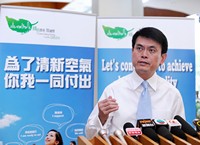 |
| No.5 August, 2009 |
|
| |
|
| |
Air Quality Objectives Review |
|
| |
|
|
| |
 The Hong Kong SAR Government has launched a major new public consultation program designed to improve the city's air quality. The Hong Kong SAR Government has launched a major new public consultation program designed to improve the city's air quality.
The four-month exercise will review Hong Kong's Air Quality Objectives (AQOs) – target standards for air quality that have been in place for more than 20 years. |
|
| |
|
|
| |
Secretary for the Environment, Mr Edward Yau, said the move was designed to bring Hong Kong into line with World Health Organisation’s (WHO) Air Quality Guidelines as promised by the Chief Executive in his 2008-09 policy address.
"Air is a very important environmental resource and we must strive to ensure that our air quality can adequately protect public health," Mr Edward Yau said.
"The current AQOs of Hong Kong have been in place since 1987. They need to be updated."
Mr Yau said the move would see Hong Kong update its AQOs with direct reference to the World Health Organisations guidelines.
"In setting the new AQOs, the underlying principle is to protect public health. Achieving the WHO Air Quality Guidelines will be taken as a long-term goal and we will adopt targets in stages to update the Air Quality Objectives," Mr Yau said.
In mid-2007, the Government commissioned a review of AQOs to set higher standards for ambient air pollutant levels and better protect public health.
The review has been completed and new AQOs are proposed. They include adopting the concentration targets set out under WHO Air Quality Guidelines for carbon monoxide, sulphur dioxide and nitrogen dioxide.
The review has also recommended a series of emission control measures covering more natural gas to be used in local electricity generation, wider use of hybrid/electric vehicles, car-free zones/pedestrianisation scheme, expanding of rail network and mandatory implementation of Building Energy Codes.
Full implementation of these measures would have deliver massive healthy benefits to the community including 4,200 fewer annual hospital admissions currently attributable to air pollution and a one month increase in average life expectancy.
The economic benefits to society (mainly due to improvement of public health and savings in energy costs) are estimated to be about HK$1.228 billion per year, which are substantially higher than the estimated economic costs of HK$596 million.
"We fully appreciate the community’s desire to improve our air quality as soon as possible," Mr Yau said.
"The proposed measures, however, will have different degrees of impact on the general public. For example, electricity tariffs and bus fares may increase. Our way of living may also need adjustment.
"We therefore have to seek the views of the public on the package of measures for reducing emissions, the price the community is willing to pay and the pace at which the control measures should be taken forward such that the community can work together for attaining the new AQOs."
|
|
| |
|
|
|
| |
 |
|
|
| |
|
|
|
| |
|
|
|
|
 |

